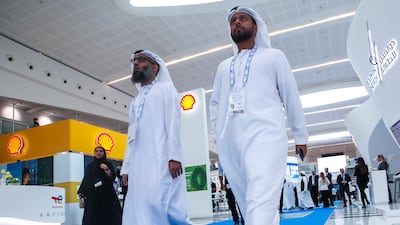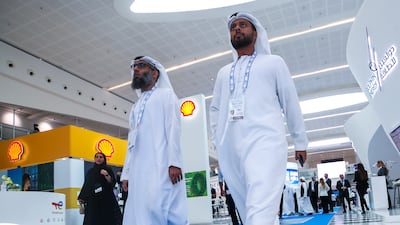Heads of energy majors and policymakers will convene in Abu Dhabi to discuss ways to accelerate the transition to clean energy, ahead of a major UN climate conference this year.
The Abu Dhabi International Petroleum Exhibition and Conference (Adipec), which will run from October 2 to 5, comes weeks ahead of November’s Cop28 summit where countries will assess where they stand with regards to climate goals as part of a process called the global stocktake.
The adoption of renewable energy has gathered pace since Russia’s invasion of Ukraine last year, which disrupted global oil and gas markets and pushed Brent crude, the benchmark for two thirds of the world’s oil, to nearly $140 a barrel.
The world must increase clean energy spending from the $1.8 trillion expected in 2023 to $4.5 trillion per year by the start of the next decade to limit global warming to 1.5°C, the International Energy Agency says.
Countries also need to triple the global installed renewables energy capacity to 11,000 gigawatts by the end of the decade, the agency said.
“By 2030, the world will be home to an additional half a billion people, demanding more energy every year. At the same time, the global challenge of climate change calls for urgent, game-changing solutions to eliminate emissions,” Tayba Al Hashemi, chief executive of Adnoc Offshore, and chair of Adipec 2023, said.
“Every government, industry, business and individual has a role to play in decarbonising quicker, and creating the future of energy, faster, while safeguarding energy security and ensuring nobody is left behind.”
Adipec is expected to draw more than 2,200 exhibitors and will feature high-profile speakers including energy ministers from Bahrain, Egypt and Turkey.
Opec secretary general Haitham Al Ghais, Suhail Al Mazrouei, UAE’s Minister of Energy and Infrastructure, and Hardeep Singh Puri, India's Minister of Petroleum and Natural Gas, are among the confirmed speakers.
Other speakers include Nasser Al Khalifa, chairman of Bahrain’s Bapco Energies, Shell chief executive Wael Sawan, TotalEnergies chairman and chief executive Patrick Pouyanne and Claudio Descalzi, chief executive of Italy's Eni.
The panel sessions will discuss the geopolitical, sustainability and economic issues around decarbonisation and the future of the energy industry.
This year, Adipec will feature a hydrogen strategic conference, which will discuss the role of the low-carbon fuel in global economies, the latest technological innovations and the actions required to scale the hydrogen economies of the future.
The event comes against the backdrop of an oil price-resurgence, sparked by a tighter crude market and signs of improving demand in China, the world’s second-largest economy and top crude importer.
Brent crude, the benchmark for two thirds of the world’s oil, has gained about 35 per cent since falling to a low of $71.84 in June.
Opec members Saudi Arabia and Russia announced this month that they would extend supply cuts of a combined 1.3 million barrels per day to the end of the year.
Russia’s decision to temporarily ban gasoline and diesel exports have also added to the continuing supply concerns.
Oil and gas industry heads have blamed the current volatility in the market on the lack of spending on new projects.
Earlier this month, Opec secretary general warned of “dire consequences” for the global economy if the world abandoned fossil fuels.
Calls to cut out hydrocarbons “set the global energy system up to fail spectacularly”, he said.
“It would lead to energy chaos on a potentially unprecedented scale, with dire consequences for economies and billions of people across the world.”
At last year’s Adipec, Dr Sultan Al Jaber, managing director and group chief executive of Adnoc, said the world would lose 5 million bpd if spending came to a halt. Dr Al Jaber is the UAE Minister of Industry and Advanced Technology and the Cop28 President-designate.












